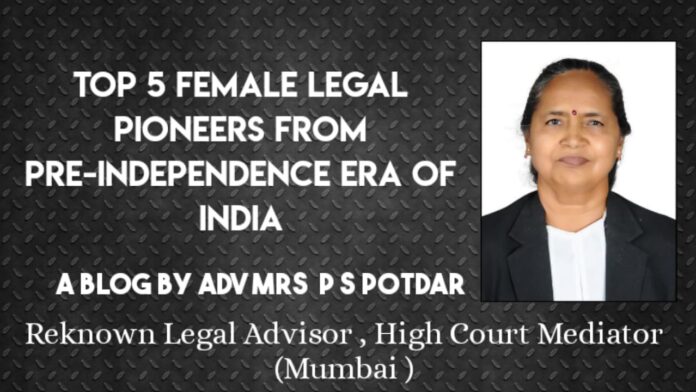The pre-independence era in India bore witness to the emergence of exceptional female legal practitioners who surmounted formidable challenges to etch their names in the annals of legal brilliance. Defying societal odds, these trailblazers carved a distinctive niche within the legal landscape, profoundly impacting both jurisprudence and societal conventions. As a legal practitioner myself, I hold them in the highest regard for their unwavering determination and remarkable accomplishments. This article provides a comprehensive exploration of the lives and feats of the pre-eminent female lawyers of that era. Let us embark on a journey through their seminal legal battles and the profound societal ramifications that ensued.
1. Cornelia Sorabji (1866-1954)
The legacy of Cornelia Sorabji stands as a testament to her audacity in challenging the prevailing norms and her staunch advocacy for women’s rights. Notably, she became the first woman to graduate from Bombay University, and her pursuit of legal education at Oxford University marked her as an educational trailblazer. Her distinction as the first Indian woman to practice law in both India and Britain, coupled with her role as a legal advisor to the British government, immortalized her as a historical luminary. Her appearance before the Privy Council in London heralded a new era for women’s representation in the legal realm.
Landmark Case: Queen-Empress v. Khatoon Bibi (1909)
Sorabji’s profound legal acumen came to the forefront during her masterful handling of Section 376 of the Indian Penal Code. The presiding Judge lauded her as an agent of gender justice, commending her for fostering equality in a deeply entrenched patriarchal society. Beyond the courtroom, this case served as a catalyst for reshaping societal attitudes, igniting a collective pursuit of women’s rightful place in society.
Impact: Sorabji’s triumph reverberated beyond legal confines, spearheading a societal shift towards gender equality and empowerment.
2. Mithan Tata Lam (1905-1975)
Mithan Tata Lam’s journey embodies resilience, highlighted by her historic role as India’s first woman judge. Her accomplished legal career and tenure as Advocate General of Bombay laid the foundation for her groundbreaking stint on the Bombay High Court bench.
Landmark Case: State of Bombay v. Narasu Appa Mali (1952)
Lam’s meticulous analysis of Section 5 of the Hindu Marriage Act showcased her profound comprehension of personal laws. Her pioneering interpretation resonated with fellow jurists, heralding a paradigm shift in legal perspectives that challenged established norms.
Impact: Lam’s unwavering dedication propelled conversations about personal law reform, paving the way for a more inclusive legal landscape.
3. Anna Chandy (1905-1996)
Anna Chandy’s legacy is one of resilience and unyielding commitment. As India’s first woman judge, she brought her extensive legal expertise to the Madras High Court bench, fortified by her prior accomplishments as a lawyer and Advocate General of Kerala.
Landmark Case: State v. Narayanan Nair (1970)
Chandy’s nuanced handling of Section 498-A of the IPC exemplified her empathetic approach to marital matters. Her judicious interpretation set a precedent for safeguarding the rights of married women, resonating as a clarion call for justice and gender equality.
Impact: Chandy’s legacy radiates as an emblem of empathy, compelling society to introspect and uphold the rights of married women.
4. Vijaya Lakshmi Pandit (1900-1990)
Vijaya Lakshmi Pandit’s legacy transcends geographical boundaries, owing to her distinguished role as the first woman to preside over the United Nations General Assembly. Her legal prowess underpinned her significant contributions to women’s rights and global diplomacy.
Landmark Case: Universal Declaration of Human Rights (1948)
Pandit’s diplomatic finesse played a pivotal role in shaping the Universal Declaration of Human Rights. Her relentless advocacy for equality and non-discrimination left an enduring imprint on the discourse of global human rights.
Impact: Pandit’s contributions resonate internationally, reinforcing the timeless tenets of human dignity and equality.
5. Kamini Roy (1864-1933)
Kamini Roy’s exceptional odyssey extended beyond the realms of legal advocacy, encompassing her literary prowess and trailblazing feat as the first woman to graduate with honors in India.
Landmark Case: Nibaran Chandra Mukherjee v. Annada Prasad Mukherjee (1924)
Roy’s impassioned plea to redefine spousal rights under Section 25 of the Hindu Marriage Act earned accolades from the presiding Judge. Her fervent advocacy illuminated a path toward gender equity.
Impact: Roy’s legacy encapsulates an exhaustive pursuit of gender parity, challenging societal norms through her legal and literary prowess.
Additional Info: Kamini Roy’s Literary Contributions
Kamini Roy’s exceptional achievements extended beyond the courtroom. Her literary brilliance flourished through her contributions to Bengali literature, where she carved a niche as a poet, essayist, and reformer. Her thought-provoking works often echoed her advocacy for women’s rights, augmenting her role as a catalyst for societal metamorphosis.
In Conclusion:
The enduring legacy of these formidable women lawyers resounds across time, a testament to their mettle and the transformative potency of their legal battles. Their landmark cases transcended legal jurisprudence, catalyzing societal transformation and establishing a foundation for a more equitable society. These legal luminaries serve as a compelling testament, galvanizing us to persistently champion gender equality and justice, ensuring their legacy endures for generations to come.
References:
- “Cornelia Sorabji: A Life” by Suparna Gooptu
- “Mithan Tata Lam: India’s First Woman Judge” by Chitra Narayanan
- “Anna Chandy: The First Woman Judge in India” by K. V. Thomas
- “Vijaya Lakshmi Pandit: Her Life and Times” by Uma Balasubramaniam
- “Kamini Roy: A Life Lived in Poetry” by Kalyani Thakur Chaudhury”

















